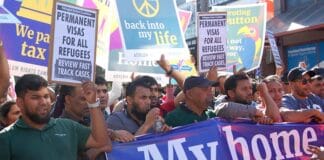A new refugee crisis in Syria has seen up to a million people trapped along the Turkish border in desperate conditions. Overcrowded camps there and in Greece face major risks from the spread of coronavirus.
Tents have become a luxury, thousands of families are sleeping in the open without shelter, and several children have died from the cold.
Since last December, when the Assad regime started its offensive to recapture Syria’s northwest province of Idlib, more than a million civilians have been displaced, hundreds killed, and entire towns destroyed and emptied of their residents. Schools, hospitals, ambulances, markets and displacement camps have all been deliberately bombed by Syrian and Russian jets.
The UN says that the situation there, in Syria’s last opposition held region, may be the worst humanitarian crisis yet in a conflict that has already driven millions from their homes and killed hundreds of thousands.
For now a fragile ceasefire is holding in Idlib—after Russia and Turkey came close to direct military confrontation.
Under the agreement struck between Putin and Erdoğan, Russian and Turkish forces will carry out joint patrols along the strategic M4 highway linking Syria’s east and west, and establish a security corridor either side of it. However, like similar deals in the past, this is likely to be short-lived. Russia still supports the Assad regime’s drive to “take back every inch” of Syria.
Turkey’s President Recep Erdoğan intervened in Syria to try to topple the Assad regime. But this effort has failed. Erdoğan is now scrambling to protest Turkey’s imperialist interests in Syria. He wants to keep Idlib out of the hands of the Assad regime and to weaken the Kurdish militia groups along the Turkish border.
Erdoğan is treading a delicate line. He is also keen not to jeopardise Turkey’s growing relationship with Moscow. Earlier this year the presidents of Turkey and Russia formally launched the TurkStream pipeline that will carry Russian natural gas to southern Europe through Turkey.
It was only when a Russian airstrike killed 36 Turkish soldiers that Erdoğan responded by launching a counter-offensive—shooting down two Assad regime fighter jets and targeting a chemical weapons storage facility and a barrel bomb factory.
He also wants to stop another massive wave of refugees from settling in Turkey.
So Erdoğan also announced that Turkey would no longer block refugees from crossing into Europe. Since then, despite the danger, thousands of people have tried to reach the EU through Greece, either by crossing the Aegean Sea to already overcrowded islands like Lesbos, Chios and Samos, or via the Evros River.
Turkey has taken in around four million Syrian refugees (far more than all of Europe put together), but Erdoğan cannot claim the moral high ground. Until now, Turkey has willingly upheld the 2016 deal it signed with the EU to prevent refugee flows in exchange for billions of euros. Turkey also built a wall along its border with Syria, and border guards have killed some 450 refugees who’ve tried to breach it.
Turkey has deported thousands back to Syria—including into the “buffer zone” inside Syria that it created during its offensive against Kurdish forces last October.
Backlash in Greece
Greece, backed by the EU, has responded to the latest refugee arrivals with violence and xenophobia. The right-wing Mitsotakis government sent the military to the borders and suspended asylum applications. The New York Times reported that Greece is using a secret extrajudicial black-site to detain and deport asylum seekers without processing their claims.
Horrific videos have emerged showing Greek forces firing tear gas on babies and shooting at a boat in an attempt to capsize it. One Syrian refugee, Ahmad Abu Emad, was shot and killed.
Instead of prioritising protection and human rights, European Commission President Ursula von der Leyen travelled to the border and praised Greece as Europe’s shield. The EU has since agreed to take between 1000-1500 unaccompanied refugee children, but this is a drop in the ocean.
The anti-refugee policies and rhetoric of Greece’s New Democracy government have encouraged far right vigilante actions against refugees, activists and NGO workers. A warehouse with provisions for refugees on Chios and The One Happy Family community centre on Lesbos were both burnt to the ground.
By contrast, the refugee rights and anti-fascist movement in Greece has organised huge protests in Athens and Thessalonika, and others on the Greek islands, in opposition to the right-wing backlash.
It is through such a mass movement that the protection of refugees, the evacuation of people from the Greek islands to European countries, and an overhaul of Europe’s broken asylum system can be won.
By Mark Goudkamp





